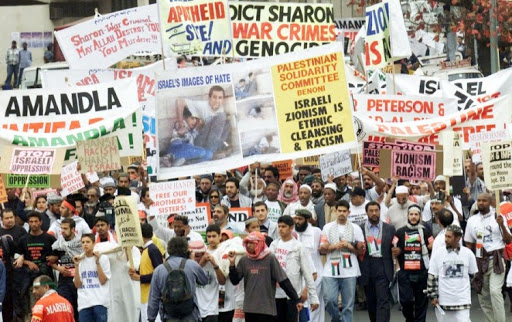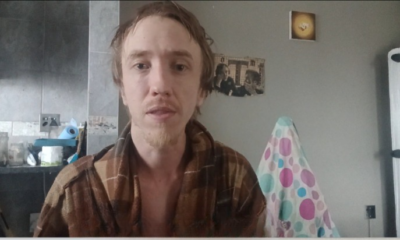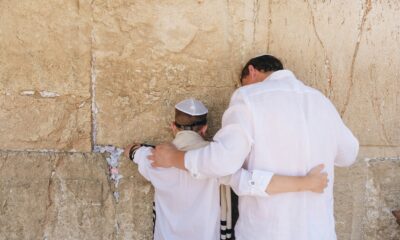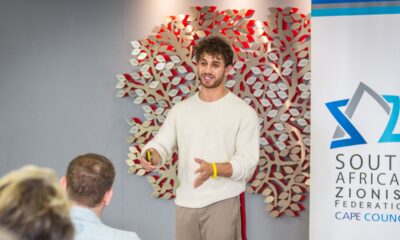
Featured Item

Look no further than Durban for origins of activist antisemitism
The infamous World Conference Against Racism held in Durban in 2001 set the standard for much of the anti-Israel and antisemitic rhetoric of today. Numerous so-called “human-rights protectors” continue to fall back on the same language and lies in their criticism of the Jewish state, and the need to hold them accountable is more pressing than ever.
So say Gerald Steinberg and Shaun Sacks, whose work at non-government organisation (NGO) Monitor aims to address this problem.
They unpacked the latest trends in antisemitism last Thursday, 4 March, at an event hosted by the antisemitism and legal subcommittee of the Cape South African Jewish Board of Deputies, tracing many developments back to the events in Durban 20 years ago.
“Durban is really the opening point,” says Steinberg, the president of Monitor. “It was in this context that the final declaration [against Israel] was adopted.
“There is a tendency to attribute BDS [the Boycott, Divestment, Sanctions movement] to the Palestinians, and to describe Omar Barghouti as the founder. That’s bad history. BDS really began at Durban through the NGO forum, and its final declaration focused on Israel. In the declaration, the term apartheid was used many times.”
The declaration was adopted by 5 000 delegates and 1 500 organisations (among them Amnesty International) and called on the international community to isolate Israel as had been done to South Africa.
Says Steinberg, “They took the package of the anti-apartheid movement and dropped it onto the Israeli-Palestinian conflict. Off course, it was entirely against Israel.
“The prosecutor of the International Criminal Court [ICC] announced last week the decision to investigate Israeli and Palestinian actions,” he says. “I don’t think anyone really takes them [the Palestinian actions] seriously – the Palestinians certainly don’t.
“It subjects Israel to further demonisation, something which, like BDS, began at Durban.”
In spite of the inroads it has made into advocacy, BDS has had almost no economic impact, Steinberg says.
“It’s a failure economically. It has had almost no impact on the Israeli economy. A few companies were affected but essentially, the economy wasn’t. What succeeded, however, was combining BDS with ‘lawfare’.
“The framework was so solidly crystalised, it succeeded in labelling Israel in general as a country of war criminals, occupiers, and colonialists,” Steinberg says. “Its allegations are uniquely focused on Israel. That’s the real damage of the Durban strategy.
“It took 20 years, but they have succeeded in labelling Israel, especially among so-called progressives and liberals.”
For this reason, the events at Durban were the trigger for the International Holocaust Remembrance Alliance working definition of antisemitism.
“There’s a direct link between Durban and the definition,” Steinberg says. “They took what they saw happening at Durban. Contemporary examples of antisemitism include denying the Jewish people their right to self-determination, applying double standards, using symbols associated with classic antisemitism, and drawing comparisons between contemporary Israeli policy and that of the Nazis.
“These grew out of Durban, and are what we have to deal with when looking at BDS.”
NGOS are leading the ICC process. “They are the ones who give ‘evidence’ to the ICC, who present volumes of allegations and false claims in order to promote the agenda,” says Steinberg. “They have massive budgets that go into their campaigns every year, have special access to the United Nations, and are motivated by a combination of post-colonial ideology and anti-Western sentiment.”
“There’s always a strong element of antisemitism.”
Many of the NGOs also became consultants, Steinberg says, driving the spirit of Durban 2001.
“They use the halo effect,” he says. “If they say Israel commits war crimes, it’s put into the media as a headline story. Journalists simply cut and paste what these NGOs report, it goes into the media with no independent investigation of accuracy, and is then quoted by diplomats.”
The organisations are believed because of their status as human-rights groups, he says.
“Because they fought apartheid 30 years ago, they have an image of morality, but they have long since left that framework.
“Robert Bernstein, the founder of Human Rights Watch, denounced his own organisation in 2009 for abandoning its moral compass and turning Israel into a pariah. Ambassadors even freely quote NGOs in spite of many of them having links to terror.”
Sacks, a senior researcher at NGO Monitor, illustrated some cases the organisation has dealt with. NGO Monitor maintains a database of about 200 human rights and humanitarian groups, promoting accountability from those claiming to advance human rights.
“Palestinian organisation Al-Haq became active following the proposal-of-action plan against Israel,” Sacks says. “It proposed sanctions via the UN, along with international legal activities. It’s a major driving force at the ICC.
“This same organisation acknowledged that it sees the ICC simply as a tool for more Palestinian independence. A video it put out in 2018 called the creation of Israel in 1948 illegal, and needing to be addressed by the ICC.”
Another is the Palestinian Centre for Human Rights (PCHR).
“At the conference, it objected to any language that didn’t recognise the ‘racist’ nature of Zionism,” Sacks says. “It wanted that to be the focus of Durban. When the conference commissioner said some of the calls by NGOs had gone too far, PCHR circulated a petition calling on her to resign.”
Certain Israeli organisations were also involved in Durban, and continue to use language in the same way, Sacks says. B’Tselem, for instance, makes a point of not calling for boycotts but for “international consequences and pressure”.
“Soon after Durban, it threw around the apartheid label, and recently released a report about Israel being a regime of Jewish supremacy.”
In 2014, Amnesty International recruited an organisation to investigate the events which transpired in Gaza 2014, relying on the PCHR to provide information.
“It put together an online tool of all attacks committed by Israelis,” Sacks says. “It was a massive platform where you could see every place Israel was accused of killing Palestinians.
“In every instance we looked at, all we did was a simple cross reference, and found that murdered ‘civilians’ were also martyrs and members of armed groups. Amnesty acknowledged none of this.”
Beyond BDS, NGOs active in South Africa include the Media Review Network, which in 2005, shared material on its website suggesting that 9/11 was a conspiracy theory, and blaming the Mossad. It also promoted the idea that the Holocaust was possibly a myth.
“Today, we are accused of spreading COVID-19 or allowing Palestinians to be infected,” Sacks says. “A Jewish anti-Israel activist wrote online that six million Jewish Israelis under COVID-19 lockdown were getting a taste of what the Palestinians experience.
“The then head of Human Rights Watch’s Middle East programme commented, saying it was just missing a ‘tablespoon of blood’. These are human-rights activists, and they have no problem using this type of language.”










